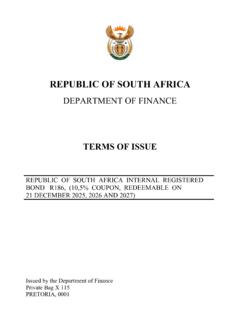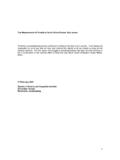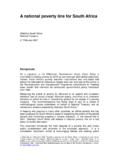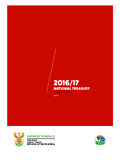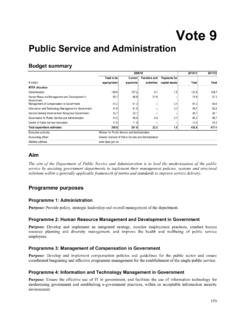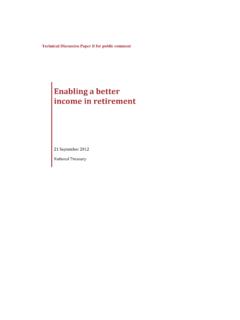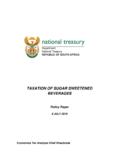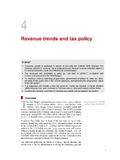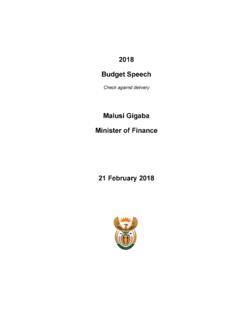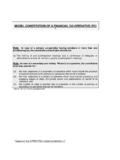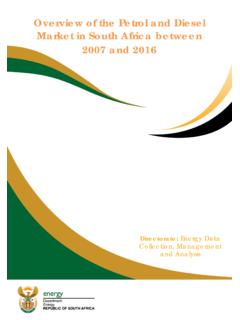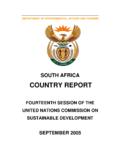Transcription of A FRAMEWORK FOR CONSIDERING MARKET-BASED …
1 DRAFT POLICY PAPER. A FRAMEWORK FOR CONSIDERING . MARKET-BASED instruments TO. support environmental fiscal . REFORM IN south africa . April 2006. National Treasury Tax Policy Chief Directorate DISCLAIMER. This draft policy paper reflects the preliminary views of the National Treasury and not necessarily those of Government. It should be noted that the document is being released in order to facilitate open and frank discussions on the subject of environmental fiscal reform. This will assist Government to formulate well-considered tax proposals, which will be informed by the needs of the country and international trends. Table of Contents EXECUTIVE I. CHAPTER 1: 1. SCOPE OF THE POLICY PAPER .. 2. DEFINITIONS .. 3. OBJECTIVES OF THE POLICY PAPER .. 6. CHAPTER 2: south africa 'S SUSTAINABLE DEVELOPMENT AND. environmental OBJECTIVES .. 10. SUSTAINABLE DEVELOPMENT IN south africa .. 11. MEASURING PROGRESS TOWARDS SUSTAINABLE DEVELOPMENT .. 13. AN OVERVIEW OF environmental PRIORITIES FOR south africa .
2 16. ECONOMIC VALUATION OF environmental GOODS AND SERVICES .. 22. CHAPTER 3: south africa 'S TAX SYSTEM .. 26. PRINCIPLES OF TAXATION .. 26. TAX INCIDENCE .. 27. AN OVERVIEW OF TAX REFORM SINCE 1994 .. 28. fiscal DECENTRALIZATION .. 31. CURRENT ENVIRONMENTALLY-RELATED TAXES AND CHARGES .. 33. THE ROLE OF ENVIRONMENTALLY-RELATED TAXES IN FUTURE TAX REFORMS .. 38. CHAPTER 4: IDENTIFYING APPROPRIATE INTERVENTIONS TO CORRECT FOR. market FAILURES .. 41. market FAILURE AND THE ENVIRONMENT .. 41. OPTIONS FOR GOVERNMENT INTERVENTION .. 43. CHOOSING BETWEEN DIFFERENT POLICY OPTIONS .. 49. THE APPROPRIATE LEVEL OF GOVERNMENT INTERVENTION .. 52. THE POLICY DEVELOPMENT PROCESS .. 53. CHAPTER 5: CRITERIA FOR ASSESSING ENVIRONMENTALLY-RELATED TAXES56. PRINCIPLES OF ENVIRONMENTALLY-RELATED TAXATION .. 56. CRITERIA FOR ASSESSING ENVIRONMENTALLY-RELATED TAXES .. 56. CHAPTER 6: OPTIONS FOR environmental fiscal REFORM MEASURES IN. south africa .. 65. USER CHARGES, LEVIES AND ADMINISTRATIVE FEES.
3 65. OPTIONS FOR REFORMING EXISTING ENVIRONMENTALLY-RELATED TAXES .. 70. OPTIONS FOR DEVELOPING ENVIRONMENTALLY-RELATED TAXES .. 78. OPTIONS FOR REFORMING NON-ENVIRONMENTALLY-RELATED TAX LAWS WITH. PERVERSE environmental INCENTIVES .. 85. ( fiscal ) INCENTIVES TO IMPROVE environmental OUTCOMES .. 89. REVENUE HYPOTHECATION .. 101. CHAPTER 7: 104. BIBLIOGRAPHY .. 106. Executive Summary ANNEX 1: TAX REVENUE TRENDS .. 111. ANNEX 2: environmental VALUATION IN south 116. ANNEX 3: MAKING GROWTH GREEN - environmental DUTY, THE WORLD. BANK .. 123. List of Tables Table 1: Waste generation in south africa in 1998 .. 21. Table 2: An overview of some valuation techniques and their potential applicability .. 25. Table 3: Environmentally-related taxes and charges in south africa (2005/2006).. 34. Table 4: Revenues from environmentally-related taxes in south africa .. 39. Table 5: Policy matrix of interventions to correct for environmental market 43. Table 6: Guiding principles of environmentally-related taxation.
4 57. Table 7: Options for reforming existing environmentally-related 70. Table 8: Proposed fuel tax FRAMEWORK for south 73. Table 9: Options for developing new environmentally-related 79. Table 10: Water use by sector in south 82. Table 11: Possible reform options to reduce perverse environmental incentives .. 86. Table 12: Use of environmentally-related tax revenues in the 92. Table 13: Review of specific tax provisions to incentivise conservation activities .. 96. List of Figures Figure 1: Gross, net and adjusted (or genuine) savings for south africa : 1970-2001 .. 15. Figure 2: A process for CONSIDERING the application of MARKET-BASED instruments .. 55. Figure 3: Suggested criteria for assessing environmentally-related tax proposals .. 58. Figure 4: Waste management 75. List of Boxes Box 1: Classifying environmentally-related taxes and 4. Box 2: Examples of environmental market 42. Box 3: Examples of information disclosure programmes in south africa .. 45. Box 4: The Indonesian Programme for Pollution Control Evaluation and Rating (PROPER).
5 47. Box 5: The south African ROSE Foundation .. 48. Box 6: Plastic bags and the use of voluntary agreements in south 48. Box 7: China's system of pollution taxes and 51. Box 8: Taxes and user-charges in an environmental 68. Box 9: Applying the polluter-pays 69. Box 10: Sweden's refunded NOx emissions payments .. 80. Box 11: Tradable water rights in 83. Box 12: Recent amendments to New Zealand's tax depreciation 95. Executive Summary Box 13: Tax measures to promote conservation in Australia .. 100. Executive Summary EXECUTIVE SUMMARY. Introduction Sustainable development is about enhancing human well-being over time and managing a broad portfolio of economic, social and environmental assets that society has at its disposal in order to sustain a flow of consumption1. As the south African economy continues to develop, it is increasingly important to ensure that it does so in a sustainable way and that, at the same time, issues of poverty and inequality are effectively addressed.
6 It is, therefore, important to appreciate that it's not just the quantity of growth that matters, but also its quality. The aim of this policy paper is to outline the role that MARKET-BASED instruments , specifically environmentally-related taxes and charges, could play in supporting sustainable development in south africa , and to outline a FRAMEWORK for CONSIDERING their potential application. The paper focuses on the options for environmental fiscal reform and the policies and measures capable of contributing to both revenue requirements and environmental objectives. The policy paper therefore seeks to: Explore how environmentally-related taxes and charges could assist in progressing towards the achievement of environmental goals and objectives in a cost effective and efficient manner;. Explore how environmentally-related taxes are able to contribute to revenue- raising requirements;. Provide a guiding FRAMEWORK and develop a process for CONSIDERING the use and development of different MARKET-BASED instruments ; and Provide a consistent set of criteria for evaluating environmentally-related tax proposals.
7 Scope of the policy paper MARKET-BASED instruments are a package of policy instruments that seek to correct environmentally-related market failures through the price mechanism. By seeking to alter the relative prices that individuals and firms face, MARKET-BASED instruments could be a more efficient way of addressing certain environmental concerns. In some instances, such instruments could be used to replace command-and control measures, but in most cases they have a complementary role. In focusing on MARKET-BASED instruments for environmental fiscal reform, the policy paper primarily looks at reforms to revenue-raising instruments , particularly environmentally- related taxes and charges and their role in wider fiscal policy. Reforms on the expenditure side, such as direct subsidies or more general government expenditure, are not considered in detail although they have formed important aspects of environmental fiscal 1. World Bank (2003) Sustainable Development in a Dynamic World: Transforming Institutions, Growth and the Quality of Life , World Development Report 2003, World Bank, Washington DC.
8 I Executive Summary reform programmes internationally. Such issues will be the subject of future work. However, some subsidy-related incentives, specifically where they take the form of tax expenditures (such as reduced tax rates or exemptions) or revenue recycling are dealt with in this policy paper. Definitions In line with international classifications, an environmentally-related tax is classified as a tax whose tax base is a physical unit (or proxy of it) that has a proven specific negative impact on the environment . Put slightly differently, an environmental tax is a tax on an environmentally-harmful tax base. Included in this definition are transport fuels, motor vehicle taxes, emissions taxes, landfill taxes and, more broadly, energy taxes. Although the definition does not make reference to the intent of the tax, it is nevertheless of critical importance but it should not be used for classification purposes. By classifying environmentally-related taxes according to the tax base, the debate over intent is also likely to be highlighted since some (many) such tax instruments were historically introduced without specific consideration for environmental issues.
9 A tax is defined as a compulsory unrequited payment not proportional to the good or service received in return for that payment. Characteristics of a tax include: No direct benefits accrue to individual beneficiaries in exchange for payments;. Payments are enforced in terms of legislation; and Government or organs of State directs the use of tax revenues. A statutory levy is a compulsory payment and is, therefore, a tax. A user-charge is defined as a requited payment for a specific service rendered. User- charges are therefore very close to prices or consumer tariffs in the case of electricity, for example. Characteristics of a user-charge include: A marketable good or service is provided to identifiable beneficiaries;. Direct and proportional benefits accrue to beneficiaries in exchange for payments;. and Transactions take place in a willing buyer market . Administrative fees are a form of user-charges and are usually implemented by (government) agencies to recover all or more usually, a proportion of the costs involved in providing a service.
10 Characteristics of administrative fees include: A good or service is provided to identifiable beneficiaries;. Direct benefits accrue to beneficiaries; and Payment is required for the provision of certain government goods and / or services. Despite the significant conceptual differences between taxes and user-charges, under certain circumstances relating to the environment, it might be difficult to clearly distinguish between the two. In order to minimise any grey areas, the definitions must be applied as ii Executive Summary strictly as possible and different situations, particularly with respect to the environment, may need to be considered on a case-by-case basis. environmental priorities for south africa environmental assets form an integral part of human well-being and it is important that they are managed appropriately. At present, south africa does not have an over-arching National Strategy for Sustainable Development and a coherent approach to measuring the sustainability of current resource use and consumption trends.
